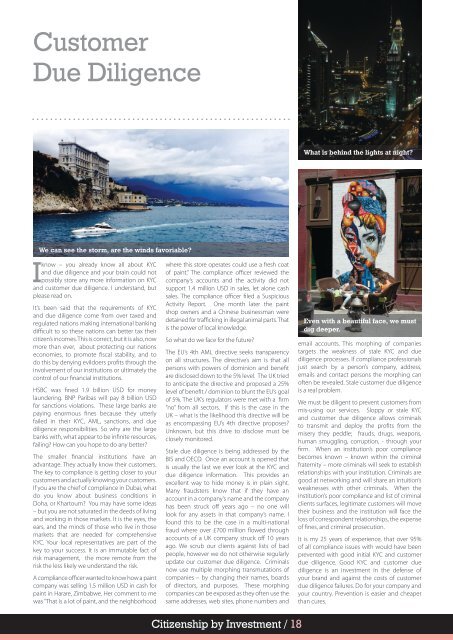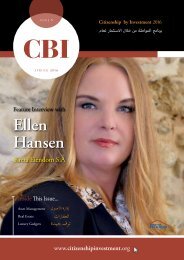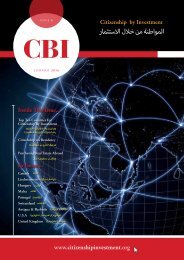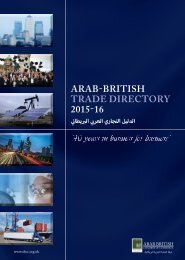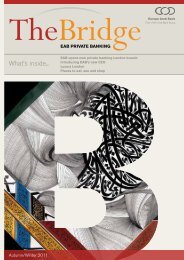Citizenship by Investment 2014
You also want an ePaper? Increase the reach of your titles
YUMPU automatically turns print PDFs into web optimized ePapers that Google loves.
Customer<br />
Due Diligence<br />
What is behind the lights at night?<br />
We can see the storm, are the winds favoriable?<br />
I<br />
know – you already know all about KYC<br />
and due diligence and your brain could not<br />
possibly store any more information on KYC<br />
and customer due diligence. I understand, but<br />
please read on.<br />
It’s been said that the requirements of KYC<br />
and due diligence come from over taxed and<br />
regulated nations making international banking<br />
difficult to so these nations can better tax their<br />
citizen’s incomes. This is correct, but it is also, now<br />
more than ever, about protecting our nations<br />
economies, to promote fiscal stability, and to<br />
do this <strong>by</strong> denying evildoers profits through the<br />
involvement of our institutions or ultimately the<br />
control of our financial institutions.<br />
HSBC was fined 1.9 billion USD for money<br />
laundering. BNP Paribas will pay 8 billion USD<br />
for sanctions violations. These large banks are<br />
paying enormous fines because they utterly<br />
failed in their KYC, AML, sanctions, and due<br />
diligence responsibilities. So why are the large<br />
banks with, what appear to be infinite resources,<br />
failing? How can you hope to do any better?<br />
The smaller financial institutions have an<br />
advantage. They actually know their customers.<br />
The key to compliance is getting closer to your<br />
customers and actually knowing your customers.<br />
If you are the chief of compliance in Dubai, what<br />
do you know about business conditions in<br />
Doha, or Khartoum? You may have some ideas<br />
– but you are not saturated in the deeds of living<br />
and working in those markets. It is the eyes, the<br />
ears, and the minds of those who live in those<br />
markets that are needed for comprehensive<br />
KYC. Your local representatives are part of the<br />
key to your success. It is an immutable fact of<br />
risk management, the more remote from the<br />
risk the less likely we understand the risk.<br />
A compliance officer wanted to know how a paint<br />
company was selling 1.5 million USD in cash for<br />
paint in Harare, Zimbabwe. Her comment to me<br />
was “That is a lot of paint, and the neighborhood<br />
where this store operates could use a fresh coat<br />
of paint.” The compliance officer reviewed the<br />
company’s accounts and the activity did not<br />
support 1.4 million USD in sales, let alone cash<br />
sales. The compliance officer filed a Suspicious<br />
Activity Report. One month later the paint<br />
shop owners and a Chinese businessman were<br />
detained for trafficking in illegal animal parts. That<br />
is the power of local knowledge.<br />
So what do we face for the future?<br />
The EU’s 4th AML directive seeks transparency<br />
on all structures. The directive’s aim is that all<br />
persons with powers of dominion and benefit<br />
are disclosed down to the 5% level. The UK tried<br />
to anticipate the directive and proposed a 25%<br />
level of benefit / dominion to blunt the EU’s goal<br />
of 5%. The UK’s regulators were met with a firm<br />
“no” from all sectors. If this is the case in the<br />
UK – what is the likelihood this directive will be<br />
as encompassing EU’s 4th directive proposes?<br />
Unknown, but this drive to disclose must be<br />
closely monitored.<br />
Stale due diligence is being addressed <strong>by</strong> the<br />
BIS and OECD. Once an account is opened that<br />
is usually the last we ever look at the KYC and<br />
due diligence information. This provides an<br />
excellent way to hide money is in plain sight.<br />
Many fraudsters know that if they have an<br />
account in a company’s name and the company<br />
has been struck off years ago – no one will<br />
look for any assets in that company’s name. I<br />
found this to be the case in a multi-national<br />
fraud where over £700 million flowed through<br />
accounts of a UK company struck off 10 years<br />
ago. We scrub our clients against lists of bad<br />
people, however we do not otherwise regularly<br />
update our customer due diligence. Criminals<br />
now use multiple morphing transmutations of<br />
companies – <strong>by</strong> changing their names, boards<br />
of directors, and purposes. These morphing<br />
companies can be exposed as they often use the<br />
same addresses, web sites, phone numbers and<br />
Even with a beautiful face, we must<br />
dig deeper.<br />
email accounts. This morphing of companies<br />
targets the weakness of stale KYC and due<br />
diligence processes. If compliance professionals<br />
just search <strong>by</strong> a person’s company, address,<br />
emails and contact persons the morphing can<br />
often be revealed. Stale customer due diligence<br />
is a real problem.<br />
We must be diligent to prevent customers from<br />
mis-using our services. Sloppy or stale KYC<br />
and customer due diligence allows criminals<br />
to transmit and deploy the profits from the<br />
misery they peddle; frauds, drugs, weapons,<br />
human smuggling, corruption, - through your<br />
firm. When an institution’s poor compliance<br />
becomes known – known within the criminal<br />
fraternity – more criminals will seek to establish<br />
relationships with your institution. Criminals are<br />
good at networking and will share an intuition’s<br />
weaknesses with other criminals. When the<br />
institution’s poor compliance and list of criminal<br />
clients surfaces, legitimate customers will move<br />
their business and the institution will face the<br />
loss of correspondent relationships, the expense<br />
of fines, and criminal prosecution.<br />
It is my 25 years of experience, that over 95%<br />
of all compliance issues with would have been<br />
prevented with good initial KYC and customer<br />
due diligence. Good KYC and customer due<br />
diligence is an investment in the defense of<br />
your brand and against the costs of customer<br />
due diligence failures. Do for your company and<br />
your country. Prevention is easier and cheaper<br />
than cures.<br />
<strong>Citizenship</strong> <strong>by</strong> <strong>Investment</strong> / 18<br />
CbI PUBLICATION.indd 18 19/09/<strong>2014</strong> 09:32


